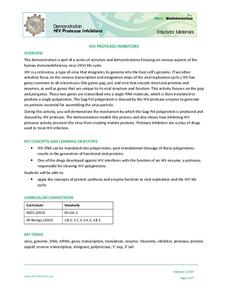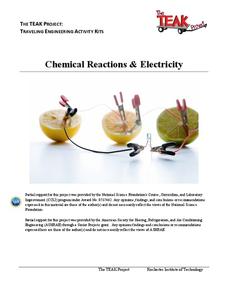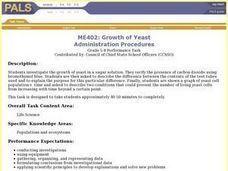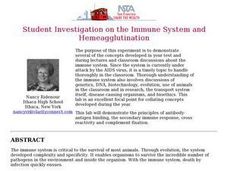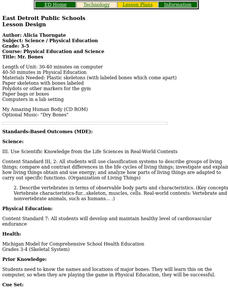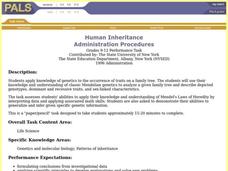Curated OER
Pregnancy and Differentiation
In this pregnancy worksheet, students review the 5 steps of human development from ovulation to implantation plus embryo development. Students also review the 3 stages of birth. This worksheet has 8 fill in the blank, 4 drawing, and 3...
Curated OER
Chromosome Karyotyping
High schoolers explore chromosome karyotyping. In this chromosome karyotyping lesson plan, students use a chromosome kit to explore chromosome syndromes and disorders. They also produce a large model of a cell with chromosome to simulate...
Curated OER
Human Heart Anatomy
Students identify the 4-chambers and major blood vessels of the heart and
construct a model of a 4-chamber heart. They sketch their model, identify the chambers/vessels, state the condition of the blood in each chamber/vessel, and...
Curated OER
Organ Systems
Students examine organisms that are composed of tissues, organs, and systems. They dissect a fetal pig and explore the assigned organs systems such as the skeletal, muscular, and circulatory organs. Students identify and explain their...
Teach Engineering
Microfluidic Devices and Flow Rate
When you have to flow, you have to flow. The lesson introduces class members to microfluidic devices and their uses in medicine. They watch a short video on how the diameter affects the rate of flow. The worksheet has individuals...
Serendip
Understanding How Genes Are Inherited via Meiosis and Fertilization
Bring the excitement of genetics to scholars with a dynamic hands-on meiosis modeling experience. During the activity, biologists follow step-by-step procedures to build chromosomes, model independent assortment, learn about crossing...
Teach Engineering
Making Model Microfluidic Devices Using JELL-O
Nothing flows like J-E-L-L-O! In the final portion of a four-part series, pupils create scale models of microfluidic devices out of gelatin and bendable straws. They use their devices to test various flow rates in the delivery of...
Howard Hughes Medical Institute
HIV Protease Inhibitors
How do doctors fight a virus that's constantly mutating? Show science scholars how we fight HIV using one of its own most fundamental processes through a thoughtful demonstration. The lesson focuses on how protease inhibitors prevent HIV...
Serendip
How Do Muscles Get the Energy They Need for Athletic Activity?
Every muscle movement requires energy, but where does that energy come from? Scholars answer this question and more as they complete a worksheet. By following the directions, completing research, and discussing it as a class, they begin...
California Institute of Technology
Physics of Light
Gummy bears are tasty, but did you know they are also used to determine color and light properties? Use the activity as a way to demonstrate light absorption, light reflection, and refraction with high schooler....
Rochester Institute of Technology
Chemical Reactions and Electricity
After a discussion of chemical reactions and electricity, scholars break into groups and follow a scripted activity to discover if fruit can power a clock. After a concluding discussion, the class a presented with a challenge.
NASA
Producers Make Their Own Food
During an inquiry-based lesson plan, scholars decide which variable to test and then design an experiment to determine the needs of producers. After two weeks, they complete a full analysis and research paper.
Curated OER
TE Lesson: What's Dominant?
Students study the number of chromosomes in the body cells, sperm cells, and egg cells of humans. They define allele, and examine the difference between dominant and recessive alleles. They complete an activity with jelly beans that...
Curated OER
Immune System: The Master of Self-Defense
Students examine the role of the immune system in the human body. They conduct a hand-washing experiment, answer questions while viewing videos, discuss key vocabulary, draw and label illustrations, and observe demonstrations and record...
Curated OER
ME402: Growth of Yeast
Students investigate the growth of yeast in a sugar solution. They verify the pressure of carbon dioxide using bromothymol blue. Students are asked to describe the difference between the contents of the test tubes used and to explain...
Curated OER
Biology: Sun, Skin and Cancer
Students identify basic components of skin on a cross sectional diagram. They provide a basic description of cancer in terms of cell biology. Students explore the ABCD of skin cancer/mole evaluation and perform their own evaluation of...
Curated OER
Bacteria Aren't All Bad!
Teaching students about the diversity of the Bacteria Kingdoms and their importance to humans
Curated OER
Student Investigation on the Immune System and Hemeagglutination
Students perform an experiment to demonstrate the principles of antibody-antigen binding, the secondary immune response, cross reactivity, and complement fixation. The materials to be used include antibodies from a rabbit that was...
Curated OER
The Optimization of Food
Young scholars discuss nutrition and how to make better choices with food. In this algebra and nutrition lesson, students discuss the way the body process food and the importance of nutrition for our cells. They discuss calories, fats...
Curated OER
Mr. Bones
Students play CD-ROM game My Amazing Human Body, and participate in relay game in Phys. Ed. where they put together skeleton on which body parts are labeled.
Curated OER
Making Connections: Exploring Our Brains through the Five Senses
Students record observations and create drawings and models of anatomy using their five senses. They describe the structures of a neuron and analyze each of their functions. They compare and contrast the typical structural features of a...
Curated OER
I, Robot: Chapter Four- Catch That Rabbit
Sixth graders explore the development of technology in the 20th century. In this chapter lesson, 6th graders read and discuss the literary content of chapter four, I, Robot by Isaac Asimov. They research the technology that was...
Curated OER
Human Inheritance
Students analyze genetic characteristics in a given family tree through the F2 generation. Students apply prior knowledge from Gregor Mendel's study with pea plants and his Laws of Heredity to answer questions.
University of Minnesota
Neurotransmission Model
Don't lose your marbles — you'll need them for a lesson on neurotransmission. Young scholars build a neurotransmission model using marbles, beads, rubber bands, string, and other elements. After studying specific neurotransmitters,...







